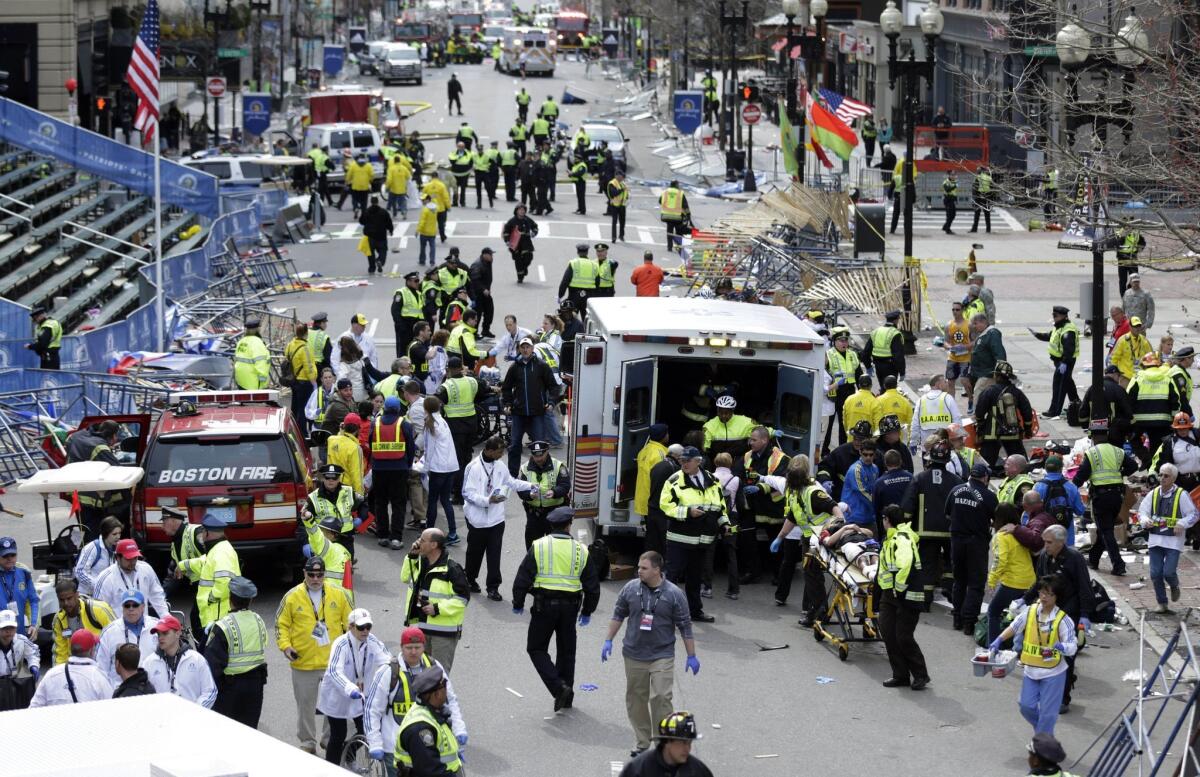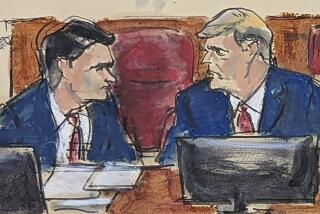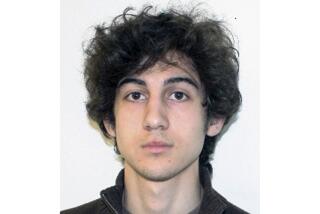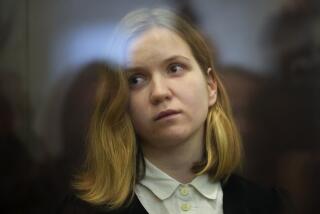Delay in Boston bombing trial denied; jury selection to start Monday

Reporting from Washington — The trial of the Russian immigrant accused in the Boston Marathon bombings two years ago opens Monday morning in a federal courthouse just a short walk from the race finish line, the scene of the worst terrorist attack in the United States since Sept. 11, 2001.
But before opening arguments and witness testimony can get underway, the judge and attorneys must find a jury of 12 people from the Boston community who can give Dzhokhar Tsarnaev a fair trial and put aside any anger from that day when three people died and scores more were injured.
Federal government attorneys are seeking his death. His defense lawyers counter that he was under the spell of his older brother, his suspected accomplice who was killed in a confrontation with authorities. But it will be the jury of 12 and six alternates, if they can be found, who will sit in judgment of a case with wide consequences as to how this country prosecutes terrorism attacks.
The trial, which was cleared to proceed by a federal appellate court Saturday, is expected to last two to three months and to test the Obama administration’s strategy of using criminal trials rather than military tribunals to prosecute federal terrorism cases.
For the administration, anything less than a death sentence could be seen as a major failure. But federal prosecutors face a significant challenge, especially in a state with significant public opposition to the death penalty. Nationally, only three federal executions have been carried out in the last 27 years.
Atty. Gen. Eric H. Holder Jr., in approving the decision to make Tsarnaev “death eligible,” said the penalty was warranted not only because of the seriousness of the crime but also because the lone defendant, an area college student, has not displayed any remorse.
The deaths on April 15, 2013, included an 8-year-old boy standing near where Tsarnaev reportedly is seen in surveillance images placing his backpack with the bomb hidden inside. Sixteen others lost legs; another 260 suffered other injuries.
After a four-day manhunt, police killed Tsarnaev’s brother, Tamerlan — the man believed to have led the plot — in a shootout in the Boston suburb of Watertown. The two brothers were believed to be angry about perceived U.S. abuses against Muslims abroad.
Dzhokhar Tsarnaev was arrested hiding in a boat in a suburban backyard. He scrawled a confession while inside the boat and later admitted to the terrorist plot during questioning, according to the FBI.
In all, Tsarnaev is charged with 30 felonies, including using a weapon of mass destruction when he and his brother allegedly tapped their cellphones to ignite the bombs.
Defense lawyers are expected to contend that Tsarnaev was under the sway of his older brother, a kickboxer who had visited Russia’s northern Caucasus region and became radicalized before returning to the Boston area.
Almost all of the trial docket remains sealed — about 90% of the case file, including motions, exhibits and even judicial orders as federal District Judge George A. O’Toole Jr. has sought to prevent potential jurors from forming opinions about Tsarnaev’s guilt or innocence.
That means that only the trial itself will reveal the answers to key questions about the case, such as why Russian intelligence officials were alarmed at Tamerlan Tsarnaev’s visit abroad and whether the FBI did enough to investigate his activities and share it with Russian counterparts.
Other crucial details still unknown are how the brothers allegedly assembled the explosives, and whether they planned next to plant bombs in New York’s Times Square. There are also unresolved questions about how much their friends and acquaintances knew about their plans.
The defense team, co-headed by Judy Clarke, a longtime death penalty opponent from San Diego, has maintained that the carnage that day instantly turned the entire Boston community into victims, making a fair trial impossible there.
Defense lawyers had asked the appeals court to delay the trial and consider relocating it to western Massachusetts, New York City or Washington.
But in Saturday’s legal ruling, two of three judges with the U.S. 1st Circuit Court of Appeals concluded the defense team had not made the required “extraordinary showing.”
On Monday, about 1,200 Boston-area residents will begin appearing at 9 a.m. at the jury assembly hall at the federal courthouse to hear an address by the trial judge. They then will begin jury questionnaires designed to weigh their fitness to serve as trial jurors.
Late the following week, potential jurors will be called into O’Toole’s courtroom for individual questioning.
To get on the jury, they must be willing to impose the death penalty.
On Twitter: @RickSerranoLAT
More to Read
Sign up for Essential California
The most important California stories and recommendations in your inbox every morning.
You may occasionally receive promotional content from the Los Angeles Times.











